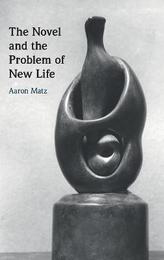
|
The Novel and the Problem of New Life
Hardback
Main Details
| Title |
The Novel and the Problem of New Life
|
| Authors and Contributors |
By (author) Aaron Matz
|
| Physical Properties |
| Format:Hardback | | Pages:280 | | Dimensions(mm): Height 235,Width 156 |
|
| Category/Genre | Literary theory
Literary studies - from c 1900 -
Literary studies - fiction, novelists and prose writers |
|---|
| ISBN/Barcode |
9781108839273
|
| Classifications | Dewey:823.009353 |
|---|
| Audience | | Professional & Vocational | |
|---|
| Illustrations |
Worked examples or Exercises
|
|
Publishing Details |
| Publisher |
Cambridge University Press
|
| Imprint |
Cambridge University Press
|
| Publication Date |
15 July 2021 |
| Publication Country |
United Kingdom
|
Description
The novel since the nineteenth century has displayed a thorny ambivalence toward the question of having children. In its representation of human vitality it can seem to promote the giving of life, but again and again it betrays a nagging doubt about the moral implications of procreation. The Novel and the Problem of New Life identifies this tension as a defining quality of the modern British and European novel. Beginning with the procreative-skeptical writings of Flaubert, Butler, and Hardy, then turning to the high modernist work of Lawrence, Woolf, and Huxley, and culminating in the postwar fiction of Lessing and others, this book chronicles the history of the novel as it came to accommodate greater misgivings about the morality of reproduction. This is the first study to examine in literature a problem that has long troubled philosophers, environmental thinkers, and so many people in everyday life.
Author Biography
Aaron Matz is Professor of English at Scripps College in Claremont, California, and the author of Satire in an Age of Realism (Cambridge, 2010).
Reviews'... Matz's fresh take on familiar classics, makes The Novel and the Problem of New Life potentially appealing to a general, nonacademic audience ... As a piece of original research, the book also makes compelling contributions to a range of fields, including Victorian and genre studies ... Matz reveals here a rich countertradition of procreative skepticism, running in parallel to the marriage plot and even supplanting it as the characteristic fiction of its era.' Lindsay Wilhelm, Los Angeles Review of Books
|